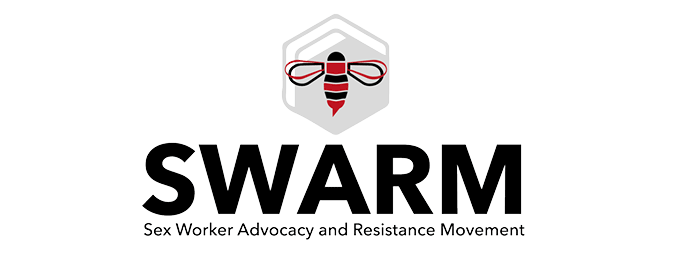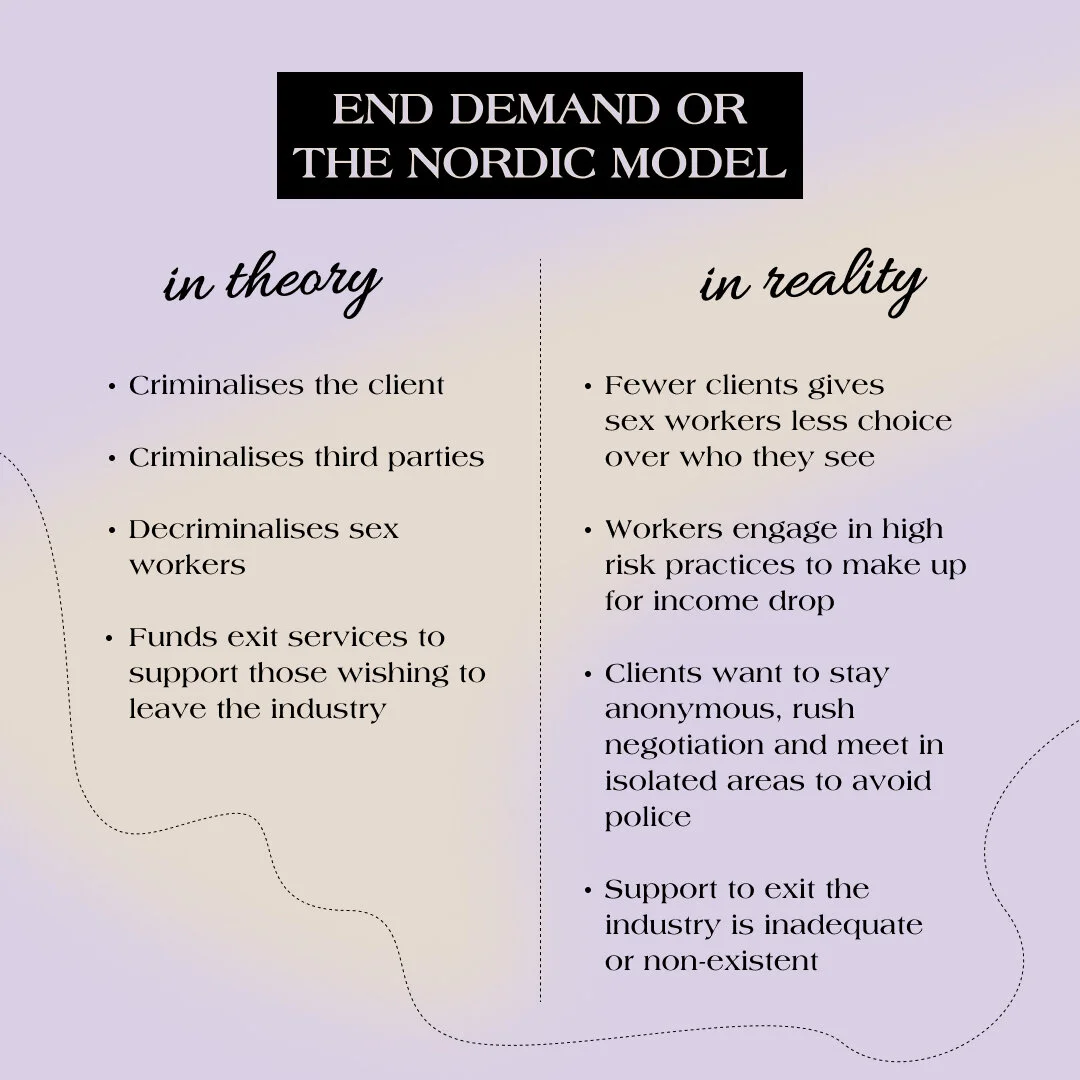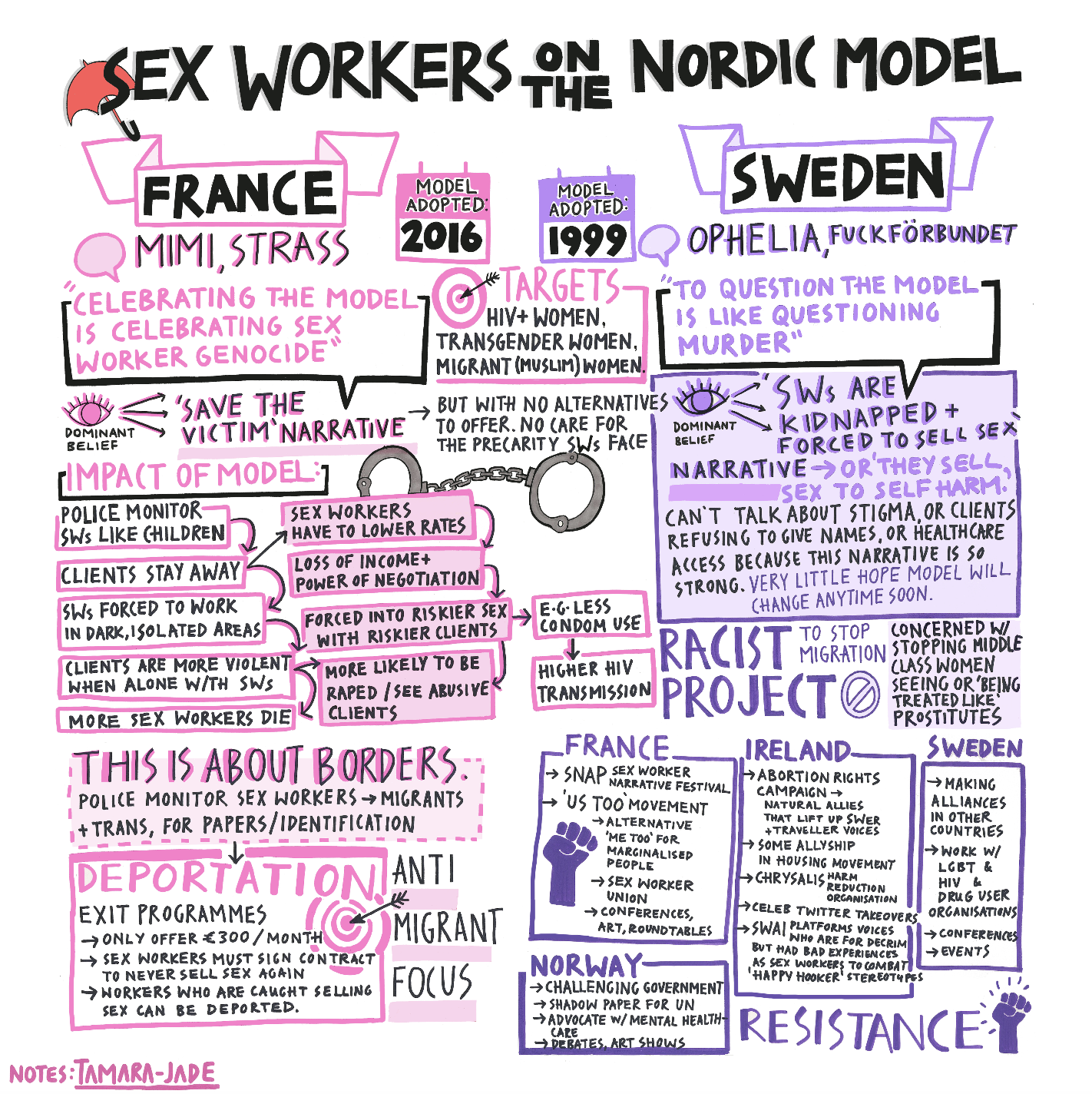What is the Swedish Model?
The Swedish Model is a legal model that criminalises the purchase of sexual services and the clients of sex workers. Depending on where you are (and your perspective) it’s also known as the Nordic Model, the Equality Model and End Demand. It originated in Sweden in 1999 and is currently in place in Sweden, Norway, Iceland, France, Ireland, Northern Ireland and Canada. Sex workers across the globe have been protesting this model since its introduction and - in countries where it has been proposed or introduced - there has been huge resistance from the sex workers who are most impacted by this law.
If you’d like to get a better overview of the different legal models that are used to regulate sex work globally, you can’t do much better than this video from Juno Mac:
Why are sex workers against the Swedish Model?
In theory, the Swedish Model is supposed to protect sex workers and end exploitation. In reality, most sex workers know that this isn’t how things really work. Supporters of the law say that it will only criminalise clients or third parties, that sex workers themselves will be decriminalised and exit services will support those who wish to leave the industry. While this seems like a fairly rosy picture, that’s not what actually happens.
Demand doesn’t disappear
Sex workers’ clients still exist but there are far fewer than them which means that sex workers have a lot less freedom to turn down clients we don’t want to see, and have to take more risks at work to make up for the loss of income.
In France, the Swedish Model was introduced in 2016, but even before the law was introduced the effects of extensive media coverage were being felt by French sex workers:
“I now do for 20 what I would not have even considered doing for 40 just a year ago. I get on cars I would not have gotten into. There are no clients. So you have to get what you can.”
Following the introduction of the law a report by Medicins du Monde which surveyed 583 sex workers found that:
“The law has had a detrimental effect on sex workers’ safety, health and overall living conditions… It has led to increased impoverishment, especially among people already living precariously, namely undocumented migrant women working in the street… The law has pushed sex workers to operate under more risky conditions with dangerous implications for their health.”
A sex worker working in Ireland - where the law was introduced in 2017 - described the circumstances she now works in:
“Ever since the law changed the worst crimes - attacks, robberies, rapes - have increased. Potentially aggressive clients are more likely to call than genuine clients.”
The reality is that criminalising clients created more dangerous working conditions for sex workers.
Image created by Tamara-Jade Kaz
Sex workers are still criminalised
There is extensive evidence that criminalising clients afects sex workers’ safety. While sex workers are not directly criminalised under this model, they contnue to face police harassment as a party to a crime and are ofen dispersed and pushed into less visible and more isolated environments.
A report by Fuckforbundet details many of the ways in which sex workers are put in danger by the law. Across Sweden, police surveillance often targets sex workers in order to “catch” their clients, waiting outside their homes or hotel rooms and monitoring their activities. Selling sex is considered a grounds for deportation as it is not “legitimate” work and migrant sex workers caught up in raids have been detained and denied medical support. Some sex workers have lost their homes:
“A local police officer explained in an interview that if the police identified sex workers having offered sexual services more than 3 times, they would contact the landlord and threat them with pimping charges if they do not evict the sex workers.”
In Norway police have also used laws around sex work to evict sex workers from their homes, and migrant sex workers have been deported after they reported violence to the police. Similar to Sweden, Norwegian police use similar tactics of surveilling sex workers in order to identify their clients. This highly punitive approach causes direct harm to sex workers’ safety:
“Amnesty International heard testimony from service providers and individual sex workers that women who sell sex had been questioned by police for carrying condoms or felt apprehensive about carrying condoms in case it led to police action against them. A representative of Oslo police district confirmed to Amnesty that the existence of condoms in indoor premises would be considered contributory evidence that the sale of sex was occurring there. This approach can act as a de facto penalty on the possession of condoms by sex workers, creating a barrier to the realization of their right to sexual and reproductive health.”
In Ireland it’s still illegal for two or more people selling sex to work together from an indoor premises - this basic safety measure is considered ‘brothel keeping’. One worker in Ireland describes how this has affected her working practices:
“I’ve only ever worked alone because of this law. I wouldn’t like to be in the position where the Gardaí might arrest me, but it would definitely be safer to work with another girl.”
Furthermore, Sex Workers Alliance Ireland (SWAI) report that since the introduction of the law in Ireland there have been 55 arrests of sex workers for working together included at least one incident of two migrant sex workers being arrested and charged with brothel-keeping due to working together. One of the workers was pregnant. They report that the change in the law to criminalise clients has increased police attention on sex workers and increased convictions for sex workers, despite the law having been sold as a way to protect us.
Image created by Tamara-Jade Kaz
Criminalisation increases exploitation
In the popular imagination of sex work, third parties are often imagined to be shadowy ‘pimps’ who violently control vulnerable women. While we don’t deny that exploitation of this nature occurs, the reality of third parties is often more complex. Laws that criminalise third parties rarely differentiate between coercive or exploitative third party involvement or more practical and supportive third parties - such as drivers, security, cleaners, assistants, or friends and partners.
The Global Network of Sex Work Projects notes that third party criminalisation obstructs HIV prevention, forces sex workers to compromise our safety, and can increase prosecutions for sex workers and our friends and families, as well as limiting our access to basic needs such as housing. These laws put sex workers in danger:
“Laws and policies which criminalise third parties fail to acknowledge that sex workers need protections to be put in place, in order to address cases of exploitative or harmful contractual or employment based relationships with others. Criminalising these relationships necessitates that they be hidden from authorities and placed outside the bounds of regulation. The blanket criminalisation of third parties assumes that all third party relationships, regardless of context and circumstance, are exploitative and leaves sex workers without access to legal measures to challenge exploitation or abuse when it does happen.”
Sex workers frequently report how laws around third parties make us afraid about the impact on the people we are close with:
“More scared to see cops, scared of the cops showing up to my house because my flatmate and I share a lot with my money, fear of my trans partner ending up in jail from benefiting off of my salary.”
The Legal Assistance Centre in Namibia pointed out the way that laws criminalising third parties function in practice are off absurd:
“The offence... is not limited to persons who actively seek to control or encourage prostitution for their own profit, but would apply equally to a child who knows what his mother or father or sibling does to get money for the groceries.”
In contrast to what was intended by the change in law, Swedish sex workers actually report an increased reliance on third parties:
“Because the pimping law also leads to sex workers’ eviction from their flats and landlords being potentially charged with pimping offenses, and with hotels actively working to identify and ban sex workers from their premises, it is very difficult to find a secure place to work. This is fertile ground for exploiters to abuse the most vulnerable in the industry, offering them clients or a place to work under precarious circumstances, in return for money and sexual services.”
The Swedish Model doesn’t stop violence, it makes it worse
We all want to stop violence against sex workers. As sex workers ourselves it is our biggest priority. And we know that the Swedish Model doesn’t do that.
The Medicin du Monde study found that since the introduction of the model in France:
“Cases of violence, of all kinds, have increased: insults in the street, physical violence, sexual violence, theft, and armed robbery in the work place. Impoverishment, increased health risks and increased exposure to violence form a vicious circle.”
Globally, sex workers report that criminalisation and increased police attention to clients has resulted in increased violence:
“In Edinburgh, sex workers reported 66 incidents of violence in 2006, compared with 126 after the implementation of kerb-crawling measures the following year. In Montreal, during a three-month period of widespread anti-client sweeps in 2001, sex workers reported three times the amount of violent incidents, and five times the amount of violent incidents with a deadly weapon than prior to the sweeps. Thai sex workers have likewise reported that, since the prohibition on US soldiers purchasing sex, their working conditions have become more dangerous. Often, soldiers will only meet sex workers in isolated locations or request that one woman service multiple soldiers to avoid drawing attention.”
A sex worker in Canada described the circumstances she works under with increased police attention:
“It pisses me off that they [the police] are there because basically what it comes down to is the shortest time that I'm out there, the shorter I'm on the street and the better I'm paid. But you [police] stand out there and you fuck up my business and scare away my dates. The longer I'm out there my chances of getting sick, raped, robbed, beat up whatever are greater so.”
In Ireland it was found that crimes (including violent offences) against sex workers increased following the introduction of the Swedish Model. UglyMugs.ie, an app where sex workers can report incidents of abuse and crime, found that there was a 92% reported increase in violent crime against sex workers in the first year after the law came in, and this rate was sustained during the second year.
The Swedish Model harms sex workers and causes violence.
Want to hear more about the daily reality of the Swedish model? This discussion from 2019 brought together sex workers from Ireland, Norway, Sweden and France to talk about the impact of the law on sex workers lives:
What are the other options?
In 2016 Amnesty International published a policy on sex workers’ rights. In it they made clear that decriminalisation is essential for the human rights of sex workers to be protected. When they released the policy they said:
“Extensive research, including four geographically specific reports published alongside Amnesty International’s policy today, shows that sex workers are often subject to horrific human rights abuses. This is in part due to criminalization, which further endangers and marginalizes them and impedes their ability to seek protection from violence and legal and social services.”
In a Q&A on the policy Amnesty said:
Under this model there is better scope for sex workers’ rights to be protected—whether that be:
- access to health care;
- their ability to report crimes to the authorities;
- their ability to organise and work together for increased safety;
- or the comfort of knowing that their family will not be charged for “living off the proceeds” of sex work.
Amnesty’s advice for legal and policy change on sex work? They say:
Laws on sex work should focus on protecting people from exploitation and abuse, rather than trying to ban all sex work and penalize sex workers.
Amnesty isn't alone in this policy position. The World Health Organisation (WHO) agree:
Decriminalising sex work could lead to a 46% reduction in new HIV infections in sex workers over 10 years; eliminating sexual violence against sex workers could lead to a 20% reduction in new HIV infections.
So do UNAIDS:
Many of the human rights challenges, vulnerabilities and barriers sex workers face in accessing HIV services are due to criminalisation and the restrictive laws, regulations and practices they face.
ILGA (the International Lesbian, Gay, Bisexual, Trans and Intersex Association) support decriminaliation:
Concerned by the high levels of violations, violence, discrimination and exclusion faced by sex workers, this global LGBTI network representing more than 1,500 organisations from each region of the world join a growing number of human rights, health and anti-trafficking organisations demanding governments recognise sex work as work, and protect sex workers’ labour and human rights.
The World AIDS Campaign says:
Arguing for the decriminalisation of sex work does not necessarily mean an endorsement of sex work. It shows an awareness of the dangers of the criminal law; an awareness that criminalising sex workers will neither eradicate the industry, nor alter the set of power relations that may be associated with it. It recognises that the laws that criminalise sex work punish women and particularly women living in poverty, and women of colour most severely and create a dangerous environment for working and living. A decriminalised sex work system is therefore the most effective and pragmatic way of addressing the conditions of women in the sex industry.
From Human Rights Watch:
Decriminalizing sex work maximizes sex workers’ legal protection and their ability to exercise other key rights, including to justice and health care. Legal recognition of sex workers and their occupation maximizes their protection, dignity, and equality.
STOPAIDS support decriminalisation on the basis that sex workers should be able to:
- have access to the highest attainable standard of health
- be safe and live free from violence
- be able to earn a secure income
There are mountains of evidence internationally that shows that decriminalisation is the best practice to ensure the safety of sex workers at work. Sex worker rights organisations, academics, health workers, direct service providers, international health bodies: all agree that decriminalisation is the best legal model to ensure the health and safety of sex workers.
Supporters of the Swedish Model often try to paint those who oppose it as privileged, or as mere puppets of shadowy sex industry forces. The opposite couldn’t be more true. Sex workers across the world support decriminalisation. Sex workers know better than anyone what our working lives are like, and we know better than anyone what circumstances will improve them.
So what is decriminalisation?
This infosheet from Canadian sex worker group Stella helps explain the basics:
“At its core, decriminalization means the removal of all criminal laws that prohibit selling, buying or facilitating (procuring) sex work.”
Decrim-Now UK describe it this way:
“Decriminalisation means that sex workers are able to work without threat of criminal sanctions. Criminal and administrative penalties on prostitution are repealed. Sex workers’ workplaces are regulated through employment law, enabling workers to hold their bosses to account and form trade unions.”
And DecrimNow DC have a huge store of resources, articles, and myth-busting factsheets to help you really understand decriminalisation. In particular they link to this factsheet from the Asijiki Coalition about why it’s dangerous to conflate sex work and human trafficking.
Sometimes people are confused about the difference between decriminalisation and legalisation. This article from Frankie Miren breaks it down:
“Under legalisation, sex work is controlled by the government and is legal only under certain state-specified conditions. Decriminalisation involves the removal of all prostitution-specific laws, although sex workers and sex work businesses must still operate within the laws of the land, as must any businesses.”
When sex workers say we oppose the Swedish Model or we oppose the Nordic Model, we’re not just playing an ideological game, we are saying that our lives are at risk. We are saying the Swedish Model harms sex workers. We are saying that the Nordic Model harms sex workers. Believe us.
Decriminalise sex work now!



